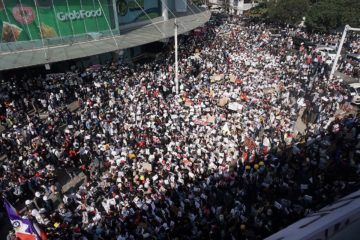 Carlos Sardina Galache in the NLR’s Sidecar:
Carlos Sardina Galache in the NLR’s Sidecar:
More than two months after the coup d’état in Myanmar, the military has not yet managed to take full control of the state beyond its monopoly on violence. In response to a massive civil disobedience movement which has paralyzed the economy through strikes in most key sectors, the Tatmadaw (as Myanmar Armed Forces are known) is unleashing all its fury on protesters, aiming to terrorize the population into submission. Over 700 civilians have been killed so far. Meanwhile, pundits and the United Nations are warning that the country risks descending into a civil war and becoming a ‘failed state’.
There is a certain historical myopia in those statements: Myanmar never had a ‘functioning state’. The army had been waging several civil wars against the ethnic minorities living in the country’s borderlands since its independence in 1948. Now the Tatmadaw is bringing to Myanmar’s heartlands – where the Bamar majority live – the brutal tactics it has been using for decades in those wars, making little to no distinction between armed combatants and civilians. Yet the violence has a different purpose depending on who is at the receiving end: in carrying out their military operations, soldiers kill Bamar for what they do (opposing its rule); they kill members of those ethnic minorities regarded as ‘national races’ for what they are (as part of a project of political domination and cultural assimilation); and they kill the Rohingya (widely regarded as foreign interlopers from Bangladesh) simply for being in the country. In response to this shared experience of repression, many Bamar protesters are developing a new sense of solidarity with the ethnic minorities – at times even including the Rohingya – while ethnic minorities are joining the civil resistance movement in states like Kachin, Chin and Kayin.
More here.
